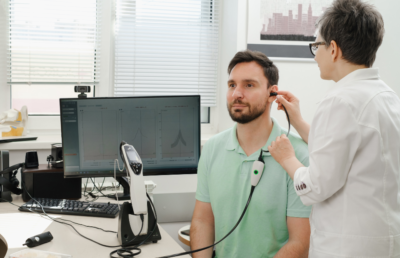Have you ever heard a ringing noise in your ears that went away after a few seconds? If so, you’ve experienced what 25 million Americans have — tinnitus is a ringing in the ears that can happen very rarely, or be so prevalent that it interferes with daily activities. If you’ve ever experienced it, you probably know how distracting it can be.
Tinnitus is a symptom associated with many forms of hearing loss. It can also be a symptom of other health problems. If you’re experiencing tinnitus on a regular basis, here are some strategies that may be able to help:
- Over 60% of patients with tinnitus find relief from amplification and hearing aids. So, if you’ve experienced tinnitus on an ongoing basis, the first step you should take is to visit an audiologist and get a hearing test that can help to identify the cause of the symptoms.
- If nothing hearing-related is uncovered, your audiologist can also point you to a general doctor who can explore other potential causes such as obesity or environmental stressors.
- If you find that the tinnitus recurs on a regular interval after a particular activity, such as being at a loud concert, share the information with your audiologist and get some hearing protection, or avoid the environment that causes the symptoms.
- Occasionally, tinnitus can be caused by stress. Relaxation exercises, such as meditation, have been show to help in certain cases.
- Noise machines, including specially designed pillows that create background noise may help with the reduction of your tinnitus symptoms.
- Special tinnitus apps generate a variety of background sounds that are helpful in the alleviation of tinnitus symptoms and can be used on-the-go with headphones.
- Cognitive behavioral therapy has been identified asone potential avenuefor reducing the impact of tinnitus on a patient. Since there is no known cure for tinnitus, CBT attempts to instead change the person’s perception of tinnitus to make it less distracting and easier to live with.
- Nicotine, alcohol and caffeine use makes tinnitus worse by reducing blood flow to the structures of the ear. Stop smoking and drinking coffee, and see if symptoms improve.
- Limit your use of aspirin, products containing aspirin, and other nonsteroidal anti-inflammatory drugs (NSAIDs) such as ibuprofen or naproxen, all of which can exacerbate tinnitus symptoms.
- Exercise regularly. Exercise improves blood flow to the structures of the ear. However, extended periods of exercise that keep your neck in a hyperextended position, such as bicycle riding, should be avoided because they can temporarily make symptoms worse.
Having issues with tinnitus? Follow step #1 above and get in touch with an audiologist for a hearing test!Reach out to us todayto set up your consultation!




